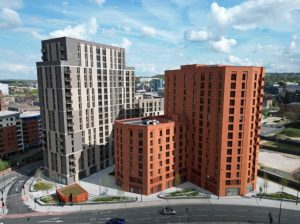Giants back property rates campaign

GLOBAL group including British Airways, Tesco, McDonald’s and Nokia have thrown their weight behind the campaign to scrap empty property rates.
Household names like B&Q, Next and Legal & General have also joined developers and small property firms across the UK to get business rate relief on empty buildings to be reapplied immediately to stop the chaos of demolitions and bankruptcy that is hitting the North.
They have sent an open letter to the Prime Minister today and the campaign has already won the backing of more than 70 MPs.
It has been led in Parliament by Halifax MP Linda Riordan.
Ms Riordan said: “Far from being an issue that will just affect jobs and regeneration in Halifax, empty rates will hurt all areas of the country, irrespective of what industry or political alignment they have.”
Campaigners say that as Britain moves into recession, firms laying people off as they fight to survive will find themselves hit for tax on the empty space if the Government continues to ignore calls for change.
Dubbed the ‘bombsite Britain’ tax over the way it has caused landlords to demolish buildings rather than go bust paying rates, the British Property Federation (BPF), trade body for property, has led a year-long campaign backed by dozens of MPs.
BPF chief executive Liz Peace, said: “It’s like making the unemployed pay income tax. Taxing hardship and business failure is a ludicrous way to help people through the hard times. Brown must act now to undo this mess.”
Campaigners want to push the Government into action after it set out measures last week to help businesses affected by the downturn.
Shadow business minister Alan Duncan called the tax ‘immoral’, saying: “Taxing something that generates no revenue does enormous damage. Removing the tax relief for empty property rates is bringing to a grinding halt any kind of activity for preparing business premises or developing wrecked premises for future use.”
John Haymes, director of property development for Hull Forward, said: “We have demolished some buildings in order to avoid paying rates but we have had to pay for other buildings that we are keeping for conservation reasons.
“It is money that could be used for other things.”
Developments in Hull, such as the Fruit Market, Humber Quays and Quay West, are already being hit by empty rates.
A couple of large industrial complexes within the Fruit Market have already been demolished, along with buildings in the Quay West area. But the new Humber Quays development, which is only halffull, is having to pay tax on its empty space.
Mr Haymes added: “The two office blocks at Humber Quays were built in advance of demand to ensure that the city had offices to offer
businesses as and when they are needed. It’s an example of where empty business rates don’t quite work.”
Bradford Centre Regeneration said that empty property rates could have a negative impact on the city’s development.
In a statement, it said: “Urban regeneration companies were incorporated to act as a catalyst to speculative development in areas where regeneration was challenging, and any measures that add costs and risk to that process, have a potentially negative impact.”
“Private sector developers and investors face many variables in assessing whether a scheme is financially viable or not, including early land assembly, and this extra hurdle could swing the balance between deciding to develop or not in priority regeneration areas such as Bradford.”
Dave Custance, head of strategic development and property for Yorkshire Forward, said that the agency had voiced concerns of businesses in the region to the Government.
“The property industry will be more cautious about developing without a commitment from prospective tenants in order to reduce the possibility of the property standing empty.”
He added: “Owners of older buildings and managed workspace will potentially face increased costs, and will face some difficult choices.”








